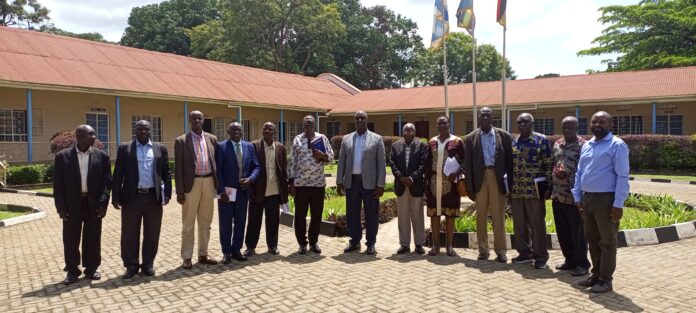
AFRICE, Bunyoro to partner in protecting sacred natural sites, indigenous foods
Bunyoro’s sacred natural sites and indigenous food systems that are at the verge of extinction due to industrialisation, encroachment and modernity could be saved following a mooted partnership between Bunyoro-Kitara Kingdom and African Institute for Culture and Ecology (AFRICE), a conservation organisation.
This comes at a time the current generation has no or less value for culture which is causing the fast diminishing of the natural sacred sites and indigenous foods.
Traditionalists insist that the said sites which have been in existence for centuries are not satanic.
They say they could be developed as local tourism sites to earn the kingdom income.
According to Wikipedia, a sacred natural site is a natural feature-large area of land or water having special spiritual significance to people’s and communities.
The sites include; mountains, hills, forests, groves, trees, rivers, lakes, lagoons, caves, islands and springs for the kingdom history dating back centuries but are on the brink of getting obliterated due to developments and degradation.
Robert Rukahemura, a special assistant in charge of culture in the Office of the Prime Minister, says the kingdom lacks money to facilitate custodians to maintain these sites, some which are in derelict state.
“Management of these sites have been robbed by modernity. We need financial support to save them from diminishing and sensitising subjects on their importance in biodiversity conservation on top of traditional crops at the advent of Genetically Modified Organisms (GMOs) which cannot be used as raw-materials to do conservation,” Rukahemura said.
He said, for example, artificial insemination will cause the extinction of some indigenous goats and cow breeds citing ente entimba (red netlike spot cow) which is a totem for Baliisa and Bagana clan members and yet cross-cultural set-ups had lived with them for long.
“We should sensitise people on how to coexist so that our culture which has been practiced over time does not disappear,” Rukahemura noted.
Denis Tabaro Natukunda, the Executive Director for AFRICE while meeting Bunyoro-Kitara Kingdom officials on November 1 in Hoima City said sensitising locals to appreciate the importance of safeguarding and restoring ecosystem resilience and integrity of sacred natural sites, is why they are partnering with the kingdom to use its cultural clout.
He said this would ensure food security and healthy of the indigenous people.
This, he said, is in an event where the indigenous and local communities are affected by climate change since they rely directly on the environment for basic livelihood needs.
Tabaro said with funding from African Biodiversity Network and Swedish Government, they are also implementing a three-year project in Buliisa, one of the districts in the kingdom dominated by the Bagungu tribe, to revive and conserve their past using farming systems that protect mother nature.
He said AFRICE has identified custodians and supported them to document their customary laws on rivers, lakes, forests, wetlands and mountains, among others.
He said in December, 2020, they sponsored Buliisa district council to pass an ordinance meant to recognise and conserve sacred natural sites as places of spiritual, cultural and ecological significance.
Tabaro said they also initiated a traditional seed centre in Buliisa for people to learn practicing agro ecology and traditional seed conservation meant to ensure food security.
Tabaro, said these have been an integral part of the people’s culture and traditions in marking births, marriage and deaths within natural sacred sites.
The AFRICE Executive director said they have concentrated on these sites in a bid to curb high rates of environmental degradation which has caused loss of food resulting in climate change as ecological sensitive places like wetlands are destroyed.
The meeting organised by AFRICE at the Kingdom offices in Hoima City, was aimed at seeking the kingdom’s support for the work of protection of the aforesaid.
This will eventually culminate into signing of a five-year memorandum of understanding between AFRICE and Bunyoro-Kitara Kingdom aimed at conserving the said sites and averting biodiversity loss, climate change and food insecurity.
Tabaro said the MOU will also boost the aforementioned ordinance which lacks strong backing from the Kingdom.
Andrew Kirungi Byakutaga, Bunyoro-Kitara Kingdom Prime Minister welcomed the partnership revealing that AFRICE’s activities are embedded in the Kingdom’s 30-year agenda to promote culture and co-existence for socio-economic transformation of the cultural institution.
He cited the introduction of modern religious tendencies as the biggest challenge in the conservation of culture since people brand it satanic.
Byakutaga believes the MOU will address all these challenges. He said some of the biodiversity species are used as totems but unfortunately some people who come from outside are contributing to their extinction.
The Premier condemned the tendencies of eating chimpanzees, saying although they (chimps) could be a delicacy to some, they are a totem to some clans in Bunyoro.
“We feel the MOU will mitigate such,” he asserted.